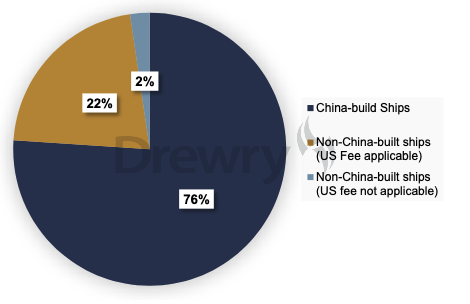The US Trade Representative (USTR) has proposed large fees for vessels operated by Chinese ship operators or those built in China that dock at US ports, in a bid to counter China’s dominance in the maritime trade. Drewry’s analysis highlights the scale of the potential impact on the heavy lift and multipurpose shipping sector.

The analyst said that about 98 percent of project carrier vessel calls (including deck carriers) at US ports in the last 12 months would have been impacted by the proposed entrance fees from the USTR. 76 percent of these calls were made by China-built ships, while 22 percent were from operators who have China-built ships in their fleet.
In the general cargo category, 56 percent of port calls would have been subjected to these fees.
The USTR proposal includes a fee of USD1 million for each port call by Chinese-operated vessels and USD1.5 million for Chinese-built vessels. A service fee will also apply to all vessels calling at US ports, regardless of nationality or vessel flag. Additionally, Drewry said the proposal suggests a “commercial cargo preference”, requiring that a percentage of US ocean exports be carried on US-flagged vessels, starting at 1 percent and increasing to 15 percent over seven years.
Drewry believes that USTR-proposed fees will impact project cargo ships more than their general cargo counterparts, as only 15 percent of the former ships are exempt from fines, leaving shippers with a very small number of vessels that are exempt from penalties.
Moreover, it notes that most of the US-flagged vessels used by the shippers in the US trade are built in China, raising questions about how regulations will apply and whether these vessels will receive exemptions. If exemptions are granted, it could lead to some reflagging; however, Drewry said this would contradict the goal of encouraging US-built ships.
“Consequently, the market will be divided into two tiers: China-built ships in addition to a limited number of ships that are neither China-built nor operated by Chinese carriers. As a result, the latter operators are likely to gain market share and higher profitability transporting goods to the US ports,” said Drewry.
While Drewry said that it is too early to discuss the specific impacts in detail, it believes implementing heavy fines in a free market is unfeasible. “From the US perspective, there is a concerted effort to re-establish the nation as a key player in the shipbuilding industry, but imposing substantial fines too quickly could lead to significant disruptions in the shipping sector, as these fines might sometimes exceed the total costs of a shipping voyage,” it warned.
“Moving forward this cost will most likely be pushed onto the end user, in the form of higher freight rates. Drewry believes the proposed USTR fees could lead to major supply chain disruptions across various industries reliant on the seaborne shipment of large and heavy project cargoes.”
















